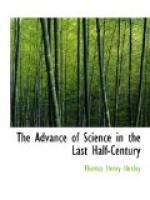[Sidenote: Francis Bacon.]
In our own country, Francis Bacon, had essayed to sum up the past of physical science, and to indicate the path which it must follow if its great destinies were to be fulfilled. And though the attempt was just such a magnificent failure as might have been expected from a man of great endowments, who was so singularly devoid of scientific insight that he could not understand the value of the work already achieved by the true instaurators of physical science; yet the majestic eloquence and the fervid vaticinations of one who was conspicuous alike by the greatness of his rise and the depth of his fall, drew the attention of all the world to the ‘new birth of Time.’
[Sidenote: The defect of his method.]
But it is not easy to discover satisfactory evidence that the ’Novum Organum’ had any direct beneficial influence on the advancement of natural knowledge. No delusion is greater than the notion that method and industry can make up for lack of motherwit, either in science or in practical life; and it is strange that, with his knowledge of mankind, Bacon should have dreamed that his, or any other, ’via inveniendi scientias’ would ‘level men’s wits’ and leave little scope for that inborn capacity which is called genius. As a matter of fact, Bacon’s ‘via’ has proved hopelessly impracticable; while the ‘anticipation of nature’ by the invention of hypotheses based on incomplete inductions, which he specially condemns, has proved itself to be a most efficient, indeed an indispensable, instrument of scientific progress. Finally, that transcendental alchemy—the superinducement of new forms on matter—which Bacon declares to be the supreme aim of science, has been wholly ignored by those who have created the physical knowledge of the present day.
Even the eloquent advocacy of the Chancellor brought no unmixed good to physical science. It was natural enough that the man who, in his better moments, took ‘all knowledge for his patrimony,’ but, in his worse, sold that birthright for the mess of pottage of Court favor and professional success, for pomp and show, should be led to attach an undue value to the practical advantages which he foresaw, as Roger Bacon and, indeed, Seneca had foreseen, long before his time, must follow in the train of the advancement of natural knowledge. The burden of Bacon’s pleadings for science is the gathering of fruit’—the importance of winning solid material advantages by the investigation of Nature and the desirableness of limiting the application of scientific methods of inquiry to that field.




